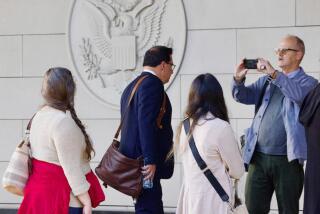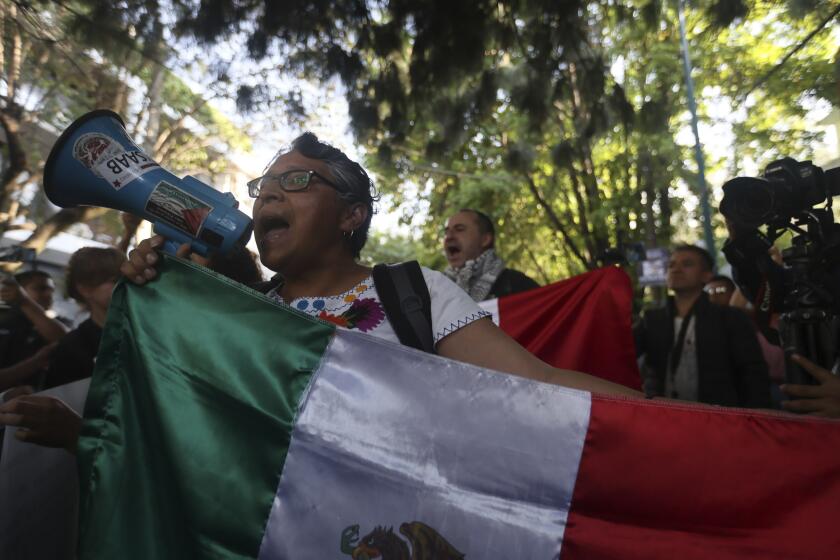For a deported man and his family, an uneasy ‘homecoming’ in Mexico

Jose Tetatzin knew he was going to be deported to his native Mexico from Detroit. Now he and his wife, Judith Cristal Gudino, would have to decide what to do next. Should the girls stay in the U.S. with Gudino, or should the whole family relocate to
As the cell door slammed behind him at an immigrant detention center in Detroit, Jose Roberto Tetatzin knew his life as an American was about to come to an abrupt end.
He thought about all the things he had acquired over 10 years of hard work in Michigan: the apartment full of furniture, the cool clothes, the cars.
And he thought about his daughters, 7-year-old Angela and newborn Lesli, both U.S. citizens who until that morning had such bright futures ahead of them.
Tetatzin knew he was going to be deported to his native Mexico. Now he and his partner, Judith Cristal Gudino, would have to decide what to do next.
Should the girls stay in the U.S. with Gudino, or should the whole family relocate to Mexico?
At night, he talked through the dilemma with other detained immigrant fathers in the same situation, men from Central America, Africa, even the Middle East. Sometimes, they cried together.
When Tetatzin was finally deported in 2015 in connection with a drunk driving conviction two years earlier, he was part of a large wave of Mexicans returning home.
More Mexicans have left the U.S. than have migrated to it in recent years, data show, a reversal of the largest flow of incoming migrants in modern U.S. history and a significant new chapter in the immigration narrative that has long dominated U.S. politics and culture.
Some have returned to reconnect with family or take advantage of new opportunities in Mexico, where a declining birth rate means less competition for jobs. Others have been forced out, either deported, like Tetatzin, or deciding to leave because, in Donald Trump’s America, they felt less welcome.
In any case, the trend has sparked both hope and concern in Mexico. Many view the large numbers coming back as brimming with potential. Many returnees bring home English and other skills learned in the U.S. But others in Mexico are concerned; they fear unwanted competition for jobs, or worry that deportees sent home for committing crimes could worsen the country’s already high levels of violence.
On the day of his deportation, as his parents picked him up at the airport in Mexico City and drove him home to Malinalco, Tetatzin saw a town full of fancy new hotels and restaurants that had appeared during his 10-year absence.
Global companies seeking cheap labor and easy access to U.S. markets had opened factories in parts of Mexico and poured in investments. Though wages were still much lower than in the U.S., the middle class was growing, and its members wanted to buy cars, build homes and take vacations in pretty towns like Malinalco.
At first, all Tetatzin could think about was getting money together to pay a coyote to smuggle him back north. It hurt watching Lesli celebrate her 1st birthday in Michigan by video chat from 2,000 miles away.
“Don’t,” Gudino told him. If he was caught, he would be charged with illegal reentry, a felony punishable by up to two years in prison.
“Stay in Mexico,” she said. “We’re coming.”
After Tetatzin had been detained, Gudino’s blood pressure had shot up, and she had fallen into depression. She had signed up for food stamps.
Studying in the U.S. was a great opportunity for the girls, she told him, but they need you more.
“They need your fatherly support,” she said. “And as a wife, I need my husband’s support.”
So she sold all the cars, furniture and electronics they’d amassed during their decade in America and bought three plane tickets back to Mexico.
They left as soon as the girls’ royal-blue U.S. passports arrived in the mail.
How do Mexicans live?
Angela’s fourth-grade teacher wrote that question on the whiteboard and gave his students 15 minutes to compose a response.
Now 9 years old, with shiny brown hair tied back with a bow, Angela brought the tip of a worn pencil to her lips as a warm breeze parted the curtains. Outside, a burst of fireworks exploded over Malinalco in celebration of yet another feast day.
How do Mexicans live? Angela was still figuring that out.
A year earlier, it had already been dark when she, her sister and her mother first arrived at what would become their new home. Past an imposing metal gate near the center of town, they entered a concrete patio lined with pots of fragrant flowers. On one side was the house where Tetatzin’s grandmother, uncles and cousins lived. On the other was the still-unfinished house Tetatzin had helped pay for, little by little over the years, by waking up before dawn on cold Michigan mornings to plow snow.
Tetatzin tearfully embraced Gudino and the girls, and then introduced them for the first time to his parents and his younger brother. His family retreated to bedrooms upstairs. Tetatzin and his brood took over a single room on the first floor.
Those first days, everything was confusing.
Angela was used to grocery stores so big a child could easily get lost in the aisles, not a weekly street market where farmers laid out tomatoes, chile peppers and tropical fruits on blankets on the ground.
She was used to the menus at McDonald’s and Subway, not small stands where women fried quesadillas and gorditas on the street.
Her stomach, unused to the bacteria unique to Mexico’s tap water, staged a revolt. Her baby sister, who had never tasted real cow’s milk in her bottle, fell ill, too. A doctor recommended that Angela go easy on the spicy food and that the baby get powdered formula.
On her bewildering first day at Miguel Hidalgo Elementary, Angela didn’t know that her school’s namesake, the dour, white-haired man whose face graced her blue uniform, was a leader of the Mexican War of Independence. Her parents didn’t know that they were expected to bring her a meal at lunchtime, so she went hungry, too embarrassed to ask the other kids to share.
Despite the fact that many American citizens have been enrolled at her school—nearly half a million children who are U.S. citizens are enrolled in Mexican schools, according to the government—there was not a single English-speaking teacher on campus. When she replied to her teacher’s questions in her native tongue, all he could do was shrug his shoulders apologetically while her classmates laughed.
Angela didn’t know that one was expected to greet strangers in Mexico with a soft kiss on the cheek, or how to ask for a soda at the corner store.
“People thought: ‘Who is this weird little girl?’” her father said.
Tetatzin, who knew exactly what it was like to be a stranger in a strange land, was determined to help.
Tetatzin had spent his 20s living in Michigan, plowing snow, raking leaves and earning more money than he had ever thought possible growing up in Malinalco as a taxi driver’s kid.
He learned English at night school, bought a succession of ever-nicer vehicles and always dressed in crisp pants and fashionable shirts. But not even a new pair of jeans or a new Chevy truck could mask the feeling that he was an outsider.
“Those are our jobs!” a passerby once screamed as Tetatzin toiled on a landscaping job with other Latino immigrants. “You don’t have the right to be in our country!”
He kept his mouth shut then, but boiled inside. The way he saw it, immigrants were quietly powering this stretch of eastern Michigan that had fallen on hard times as the auto industry faltered. They cooked in hot kitchens, picked wheat and sugar beets, and built homes and office buildings and churches for their American-born neighbors. All that, and the state wouldn’t even give them driver’s licenses.
We help them to have a different life, Tetatzin thought to himself. And yet he felt like a second-class citizen.
He had married a fellow immigrant without papers shortly after he crossed into the U.S. at age 18, but a few years later they divorced. He started drinking more, and calling home to Malinalco less. He still sent money to his father, who was using it to build the house, but the lives of his parents and brother seemed increasingly distant.
Tetatzin had always been responsible, but now he sometimes skipped work to sleep off his hangovers. One night, while coming home from a party, he saw red and blue lights flash in his rearview mirror. He was arrested for drunk driving.
Things started to change when he met Gudino.
She vividly remembers seeing him for the first time, reclined on a staircase at a Thanksgiving dinner in Pontiac. He was boyishly handsome, with sparkling eyes and a nice smile, but he had a sad look.
Gudino was lonely, too.
She had recently separated from Angela’s father, and was working as a housekeeper at a Holiday Inn. With the tips she collected scrubbing toilets and making beds, she sent back money to a younger brother in Michoacan, Mexico, to pay for medical school. The eldest sibling, she had crossed into the U.S. at age 18 after her truck-driver father left to start another family.
That cold evening in Pontiac, she and Tetatzin sat side by side, laughing as they piled plates with turkey, mashed potatoes and enchiladas. Afterward, they danced cumbia together late into the night.
When Tetatzin asked her out on a date a few days later, he said he wanted to meet her daughter, too. From that point on, every time he took Gudino out dancing, they’d take Angela somewhere special for dinner first. Angela, who shared her mother’s shiny hair, carried herself with a straight back and the self-confidence instilled in American schoolchildren. She liked Tetatzin so much she gave him an American nickname: Robby.
A year later, when Gudino welcomed their baby daughter, Tetatzin traded in his Chevy truck for a Dodge Caravan and went to work harder than ever, often coming home after the girls had already gone to bed.
As he drove the family around in the minivan, he would catch himself smiling and think: “Wow, I’m such a dad.”
But unease would inevitably follow. For years, the Spanish-language television channels in the U.S. had been reporting an increase in immigration arrests under President Obama, whom activists had dubbed “deporter-in-chief” because of his focus on deporting immigrants convicted of crimes. Now Donald Trump was campaigning for president, and telling cheering stadium crowds that Mexican immigrants were often drug dealers and rapists.
“He’s a bad man,” Angela declared one day while watching the news.
Anytime he left the house, Tetatzin scanned the streets for police or Immigration and Customs Enforcement agents. He knew something as simple as a broken taillight or a roll through a stop sign could start the domino effect toward deportation.
In the end, it was his DUI that caught the attention of immigration agents. They stopped him a few blocks from his apartment on his way to work.
With his family in Mexico, he felt like he could breathe again.
“Buenos dias,” he said on repeat every time he left the house, exchanging smiles with people he had known since he was a child. When he spied an older woman struggling to take out her trash, he would scurry over and carry it to the garbage truck himself.
“Let me do that, auntie,” he’d gently say.
He re-immersed in the religious and cultural ceremonies he had forgotten while living in the U.S. When his family hosted a large altar to the Virgin Mary at home for several days as part of a local Catholic tradition, he volunteered to help. It filled his heart to see Angela reciting prayers in front of their neighbors, and his father explaining to the girls what it all meant.
While in the U.S., Tetatzin had left for work before sunrise and come back long after dark; now he ate breakfast and dinner with his family, and traversed the city without fear of the police.
“At least here we are free,” he said. “And we’re together.”
There were more opportunities for work than when he had left. Malinalco’s historic basilica and pretty town square had earned it a place in the Mexican government’s “Pueblo Magico” program, designed to draw tourists to the country’s picturesque historical towns. Now there were restaurants selling artisanal pizzas, and eco-resorts that ran entirely on solar power.
Gudino and Tetatzin had started with a simple street stall, selling orange juice and yogurt in the mornings. But after a few months, he was offered a job as a groundskeeper of a hotel, thanks to his English and landscaping experience.
He made just $15 a day, less than he would make in two hours of work in the U.S. It might take him a lifetime of work at those wages to buy a car.
But now money seemed to mean less.
At home, Tetatzin decided he and Gudino should speak only in Spanish — creating their own immersion program for Angela and Lesli.
Angela would get frustrated when she didn’t understand what they were saying, but she still sat with Tetatzin every day as he taught her new phrases.
She learned to work harder than her classmates, as any immigrant kid must.
In the classroom this spring, as other students folded notes and paper airplanes and exasperated their teacher by repeatedly sounding fart noises, Angela was bent close to her notebook finishing several long division problems the teacher had asked the class to complete.
She worked until she got all the answers right, clapping her hands excitedly when he finally gave her the coveted check mark that meant that she had completed the assignment.
That afternoon, the teacher had an announcement. The school was starting a new program that trained a small group of superior students as tutors to help kids who were struggling. A year ago, Angela could have benefited as a recipient of the help. But now, her teacher was asking if she would be a tutor.
Please come Monday morning for the training, he told her.
Angela, back straight, smiled and nodded her head yes.
After school let out, Angela raced home, past vendors hawking ice cream, toys and tacos outside the school gates.
The fireworks that had started that morning were now bursting with more frequency.
One of the oldest neighborhoods in the city, San Juan, was celebrating its saint’s day, and Angela and her family were headed to a church there for the festivities.
A group of men raced by, toting heavy wooden planks laced with flowers that would soon be erected on the church facade. A stocky man in a white cowboy hat rang the church bells wildly.
Angela played with one of her schoolmates, Karen, skipping around with a wide smile on her face.
Her parents knew that one day, things would change.
“I’m good here,” Angela would say, even though the phone calls with her birth father, back in Michigan, sometimes hurt. His family, mostly U.S. citizens, didn’t want her living in Mexico, where even if the economy had improved, homicide rates were soaring.
Tetatzin and Gudino expect that one day, Angela and Lesli will go back to the U.S. But tonight, that day seemed far away.
When the DJ started playing music, Tetatzin encouraged Gudino to take her daughter’s hand.
Together, they danced cumbia, swaying and shuffling, their feet in perfect lockstep.
Part 2 in a series
Chapter 1: In Mexico, they made a new American dream — minus their kids
Chapter 3: She begged him not to leave Mexico again. But the lure of America was powerful, and deadly
More to Read
Start your day right
Sign up for Essential California for news, features and recommendations from the L.A. Times and beyond in your inbox six days a week.
You may occasionally receive promotional content from the Los Angeles Times.







